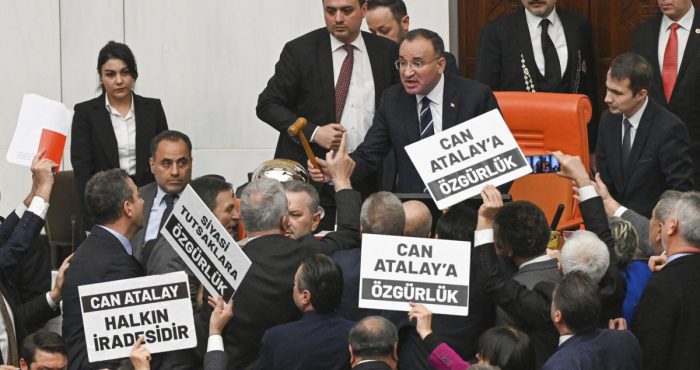Murat Yetkin stated in his article of December 15, 2022, that “Minister of Justice Bekir Bozdağ can speed up Erdoğan’s judiciary, accelerate the processes of the Court of Appeal and Supreme Court of Cassation and ensure that İmamoğlu’s decision is approved before the elections.”
Could this be possible? Could there be an instruction to the judiciary with regard to Ekrem İmamoğlu’s conviction and the political ban given to the Istanbul Regional Court of Appeals or the Court of Cassation during the appeal period?
İmamoğlu cannot be regarded as a convict until the finalization of the decision
Even though the minister’s use of the word “idiot” in reference to İmamoğlu is not regarded as illegal, İmamoğlu’s use of the word in his response, to refer to those who canceled the election he won with a contentious decision and those who supported this decision, shows that the decision, which has significant political ramifications, was made with political intentions and should be reversed. Furthermore, it is evident that Ekrem İmamoğlu has no malicious intentions. I recommend Rıza Türmen’s article on the T24 website for a more thorough analysis of this matter in light of ECtHR (European Court of Human Rights) case law. This decision, which was rendered six months before the elections, should, in my opinion, be overturned on appeal and an acquittal declared.
Regardless, İmamoğlu is not guilty and cannot be dismissed from his position as the mayor of the Istanbul Metropolitan Municipality until the conviction is officially announced, nor can he be barred from running for president.
The conviction and political ban must be finalized before the election date, and even before the start of the election campaign, which is sure to be fierce, in order to achieve the goals of preventing İmamoğlu’s presidential candidacy and seizing the infrastructure of the Istanbul Metropolitan Municipality in the elections.
The legal term “finalization” denotes the upholding of a decision, either directly or through the appeal and cassation processes. İmamoğlu’s conviction must be approved at both stages for the decision to be finalized, first at the appeal review stage at the Istanbul Regional Court of Appeals and then at the appeal review stage at the Court of Cassation.
The average duration of appeal and cassation is 55 months
According to the 2021 Official Justice Statistics published by the Ministry of Justice, in 2021 there were 903,875 files in the criminal departments of the regional courts of justice in Türkiye, including those carried over from the previous year. Of these, 552,429 were decided in 2021 while the rest were carried over to 2022. The Ministry of Justice adopted the methodology used by the Center for Excellence in the Judiciary (CEFEJ) of the Council of Europe, of which Türkiye is a member. This states that the average time to appeal an acquittal or conviction is 597 days, or roughly 20 months. The length of the appeal process in the courts of appeal in Istanbul will be greater, because they have more work than any other in all of Türkiye.
Similarly, according to the Official Justice Statistics for 2021, there are a total of 850,894 files in the criminal chambers of the Court of Cassation, including those transferred from the previous year; 290,927 of these were finalized in 2021 while the rest were transferred to 2022. Using CEPEJ’s methodology, the average appeal time to review and confirm a conviction or acquittal at the Court of Cassation is 1,068 days, or 35.6 months.
In conclusion, it will take at least 55.6 months—almost five years—to complete İmamoğlu’s conviction and political ban, and both the Court of Appeal and the Court of Cassation must concur with the decision. To put it another way, if finalized, it will take 55.6 months/4.5 years for the decision to prevent İmamoğlu from running for the presidency and being elected, or for him to be removed from the mayorship.
“No authority can give instructions to the courts”
In the regional courts of appeal and the Court of Cassation for appeals, at least 90% of the time is spent waiting for a file to be reviewed. The examining judge usually reviews a file within two to three weeks and prepares a report. The court will discuss the file based on the report, hold a hearing and hear the parties, and then make a decision thereon. It is even more crucial to hold hearings in criminal cases, and particularly in appeals of convictions. No provisions of our law mandate that certain files be reviewed more quickly, without having to wait in line, or over a shorter period of time.
Article 138(2) of the Constitution stipulates that “No body, office, authority or person shall give orders, instructions, circulars, advice or suggestions to courts and judges in the exercise of judicial power.” However, the CJP’s becoming an extension of the executive power, the shocks the judiciary has recently experienced and the fact that many of the judges currently in office were appointed by this administration all contribute to creating an environment that is conducive to advising and even instructing judges.
Concern with regard to İmamoğlu’s judiciary instruction
It is reasonable for Murat Yetkin to be concerned about recent developments in politically motivated cases, some of which have been upheld by the Constitutional Court and others by the ECtHR. Yetkin is concerned that this constitutional provision exists only in theory and that the judiciary might receive instructions regarding the İmamoğlu case, which would have significant political ramifications. Given that giving instructions to the courts is against the law and regarded as a crime, and that such instructions can be given orally without a written medium while being concealed if so given, this concern is nearly impossible to prove. It is not possible to obtain the necessary information and documents from the Presidency of the Republic, the Ministry of Justice or the CJP—either by examining their records or through an application for access to information—to address this concern, as these offices have been elevated to an almost sacrosanct position
One can only speculate about whether the concern is well founded. For this purpose, there is no other option but to make an inference based on Official Justice Statistics. However, such an inference is possible only after the event has taken place, “post mortem,” as Westerners call it, according to the developments in the İmamoğlu case. It can be assumed that the appeal process is accelerated if it takes less than 597 days on average, i.e. approximately 20 months, and slowed down if it takes longer. It can be concluded that a direction to accelerate or decelerate the process would have been given based on the fact that judges of the courts of appeal are weaker and therefore more amenable to giving instructions, since they do not have the same guarantees as the members of the Court of Cassation.
Decision before elections results in “instructions”
Yet the same is approximately the case for the Court of Cassation too. In spite of the fact that the members of the Court of Cassation have stronger guarantees than judges of appeal, the fact that all members in office were appointed by the CJP under the AK Party’s rule and under its control, and the public opinion that loyalty and political references rather than merit were effective in their appointment, one may conclude that the members were instructed or that the politicized judiciary may have acted with a political motive to speed up or slow down the process.
Based on over 40 years of experience, I can predict that even the order of review of the İmamoğlu decision by the Istanbul Regional Court of Appeals under ordinary conditions will not come before June 2023 at the earliest, otherwise I think that an instruction to speed up would have been given or the court would have acted upon the perception of such an instruction.
Only after an instruction to accelerate or decelerate will the decision be harmless, lest it be assumed that “it would be best to end this case before the elections.” If a court can be instructed on a random case, it can be instructed on any case whatsoever.




